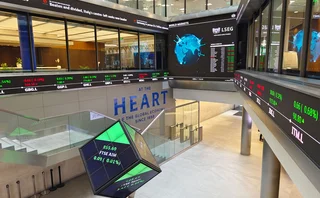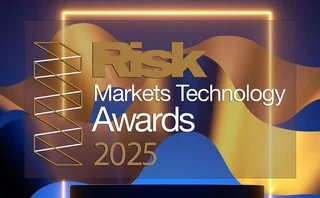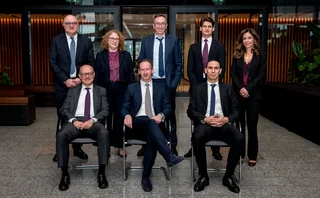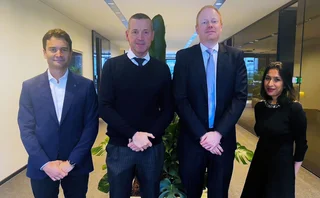
Rates flow market-maker of the year: Citadel Securities
Risk Awards 2017: New entrant showed swaps staying power as rivals fought back in 2016

Citadel Securities upended the established swap market order in 2015, becoming the first non-bank to break into the business. It subsequently surged to the top of the charts on Bloomberg's swap execution facility (Sef) for US dollar interest rate swaps, ranked by volume, response time, hit ratio, client enquiries and risk traded.
The big question was whether it could build on that success. Unsurprisingly, the large dealers fought back in 2016, knocking Citadel off the top spot for some metrics, although it still ranks in the top-three. In part, the firm says this was because it deliberately widened its razor-thin bid-offer spreads for some products, because they were attracting competitors looking to dump risk cheaply.
"We continuously analyse our flows and found smaller-size firm prices were not being used by our clients, and instead, by competitor banks. We responded to client demand by increasing the size, which naturally comes with an adjusted bid-offer, and found our target market, as the stream is now frequently leveraged by our clients," says Paul Hamill, global head of fixed income, currencies and commodities at Citadel Securities in Chicago.
Volatile trading sessions following 2016's unexpected political events also gave Citadel an opportunity to rebut rivals' claims that it would prove a fairweather friend. On the night the UK voted to leave the European Union, Citadel ranked third on Bloomberg Sef by amount of risk traded, for example.
The Chicago-based firm wasn't content to stick with US dollar swap trading, either. This year, Citadel Securities set its sights on market-making to European investors, and has already become a top-five liquidity provider on Bloomberg in euro swaps and a top-three liquidity provider in US dollar swaps since going live in Europe in February 2016. The performance is particularly gratifying for Citadel Securities' global head of fixed income, currencies and commodities, Paul Hamill, as it all came before the introduction of the second Markets in Financial Instruments Directive (Mifid II).
"As we were launching the euro swaps business, it became obvious the challenges to compete against the incumbents would be different without some of the regulatory tailwinds we had seen in the US, in particular, impartial access to trading platforms and mandatory central clearing. We knew it would be harder, but we had confidence by that point that our success could be driven by the power of our model and our value proposition to investors. It has been immensely rewarding for our team to validate that over the course of this year," says Hamill.
We promised we would deliver more products, and our team rose to the challenge by expanding rapidly into US Treasuries, credit default swap indexes and dramatically expanding our swap product offering, including into the euro currency
Paul Hamill, Citadel
In Europe, the firm also went live on Tradeweb in October, improving its access to dealer-to-client markets and enabling it to grow deeper relationships with the investor community. To help hedge its risk, Citadel is also live at interdealer platforms BGC Partners and Icap.
"When we launched US dollar swaps and began to engage our client base, feedback was positive but also clear that there needed to be a lot more to our business than just benchmark swaps. We promised we would deliver more products, and our team rose to the challenge by expanding rapidly into US Treasuries, credit default swap indexes and dramatically expanding our swap product offering, including into the euro currency," says Hamill.
Part of that strategy has manifested in expanding the firm's US Treasuries business from a purely interdealer, electronic and on-the-run business to targeting end-investors and the off-the-run market. Since the business launched in January 2016, Citadel has become a top-five liquidity provider on Bloomberg for on-the-run Treasuries in notional volume executed, and since May it has been in the top-five by risk executed. The firm hired Michael de Pass as head of treasury trading in August 2016 from Bank of America Merrill Lynch to boost the business further.
"The core electronic US Treasuries business already existed when I joined Citadel Securities, and was exclusively interdealer focused. However, clients gave us strong feedback that we could be relevant in that space. Yanfeng Chen and I focused the team's efforts in mid-2016 to scaling up the client side, and that journey continued recently with the hire of Mike de Pass to further expand into the off-the-runs. Breaking into the top-five on Bloomberg so quickly is a powerful achievement for us because it's such a competitive market," says Hamill.
De Pass's move followed a number of other big hires over the past 18 months. Nicola White joined the firm from Morgan Stanley in July as global chief operating officer for fixed income, Chris Watts joined from BNP Paribas as European head of rates trading and Brian Oliver from JP Morgan as European head of institutional sales and relationship management to build out Citadel's European business in 2015.
What investors want
Going after the more balance sheet-intensive and less-electronic markets may seem counterintuitive, but Hamill says this is what end-investors want.
"Our true goal is to serve end-investors. We really believe we can add value and through our innovations make the market better. As a new entrant, we spend a lot of time demonstrating that commitment. One way is to show we don't just play in areas that are more traditional to a firm like us, such as benchmarks and electronic-only," says Hamill.
"The off-the-run Treasury market remains dominated by banks because it is a more balance-sheet intensive, large-scale risk transfer, relationship-driven business. Success comes through truly partnering with clients, and that includes central banks and sovereign wealth funds. We're making solid progress with these investors," he adds.
Only users who have a paid subscription or are part of a corporate subscription are able to print or copy content.
To access these options, along with all other subscription benefits, please contact info@risk.net or view our subscription options here: http://subscriptions.risk.net/subscribe
You are currently unable to print this content. Please contact info@risk.net to find out more.
You are currently unable to copy this content. Please contact info@risk.net to find out more.
Copyright Infopro Digital Limited. All rights reserved.
As outlined in our terms and conditions, https://www.infopro-digital.com/terms-and-conditions/subscriptions/ (point 2.4), printing is limited to a single copy.
If you would like to purchase additional rights please email info@risk.net
Copyright Infopro Digital Limited. All rights reserved.
You may share this content using our article tools. As outlined in our terms and conditions, https://www.infopro-digital.com/terms-and-conditions/subscriptions/ (clause 2.4), an Authorised User may only make one copy of the materials for their own personal use. You must also comply with the restrictions in clause 2.5.
If you would like to purchase additional rights please email info@risk.net
More on Awards
Clearing house of the year: LCH
Risk Awards 2025: LCH outshines rivals in its commitment to innovation and co-operation with clearing members
Best use of machine learning/AI: CompatibL
CompatibL won Best use of machine learning/AI at the 2025 Risk Markets Technology Awards for its use of LLMs for automated trade entry, redefining speed and reliability in what-if analytics
Markets Technology Awards 2025 winners’ review
Vendors jockeying for position in this year’s MTAs, as banks and regulators take aim at counterparty blind spots
Equity derivatives house of the year: Bank of America
Risk Awards 2025: Bank gains plaudits – and profits – with enhanced product range, including new variants of short-vol structures and equity dispersion
Law firm of the year: Linklaters
Risk Awards 2025: Law firm’s work helped buttress markets for credit derivatives, clearing and digital assets
Derivatives house of the year: UBS
Risk Awards 2025: Mega-merger expected to add $1 billion to markets revenues, via 30 integration projects
Interest rate derivatives house of the year: JP Morgan
Risk Awards 2025: Steepener hedges and Spire novations helped clients navigate shifting rates regime
Currency derivatives house of the year: UBS
Risk Awards 2025: Access to wealth management client base helped Swiss bank to recycle volatility and provide accurate pricing for a range of FX structures







